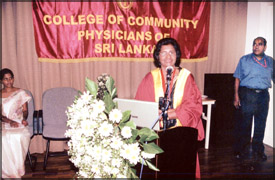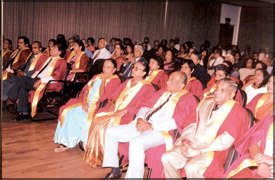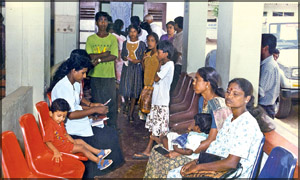|
HEALTHWATCH
Compiled and Coordinated by Edward Arambewala
Malaria eradication possible in Sri Lanka - WHO Specialist
by Edward ARAMBEWALA
|

Dr. Kamini Mendis speaking
|
The World Health Organisation’s - WHO, specialized in Malaria control
Dr. Kamini Mendis holds the view that the total eradication of Maleria,
which was at 676,000 reported cases in 1987, has now come down to less
than 200 cases in 2007 is quite possible, and within sight in Sri Lanka
if it is orgnaised enthusiastically on a war footing, almost like in a
battle against the enemy the mosquitoe.
For this, health education of the public is essential, becuase the
action has to be taken not only at the official level, but at the level
of the public too from the richest to the poorest, all going at it,
becuase it affects all and in the long run if neglected and spreads the
country’s economy too would suffer.
The WHO expert Dr. Mrs. Mendis was making the Dr. F.A. Wickremasinghe
Memorial Oration last week at the annual sessions of the College of
Community physicians Sri Lanka:
Brief history of malaria
The number of reported malaria cases in Sri Lanka fell from about
700,000 cases in 1987 to less than 200 in 2007. And here in the country,
and among the international circles, there is discussion on the
possibility of eliminating malaria from Sri Lanka.
That is the reason I chose the title of moving, “from malaria control
to elimination and eradication” - for it would be a fitting tribute to
the memory of Dr Wickremasinghe whose professional life was devoted to
the cause of public health, and much of it, to ridding this part of the
world of malaria.
I would like to address the feasibility of eliminating malaria from
Sri Lanka, but in the context of what is happening to malaria in the
world today.
For those of you in the audience who may not be fully aware of
malaria, let me start with a brief introduction.
Clinically the hallmark of malaria disease is fever with chills and
rigors, often with severe constitutional symptoms, - a disease which in
its early stages is completely treatable and curable.
But if treatment delayed, in a proportion of patients the disease
will proceed to a severe and complicated form with organ failure,
including cerebral involvement and lead to rapid death, a condition
which under the best of intensive care facilities could have fatality
rates of up to 20%.
Many of those who survive this will have residual disabilities.
Malaria is caused by a one-celled organism called plasmodium and there
are two species or types which are responsible for most of the malaria
in the world including in Sri Lanka, P.falciparum which can be fatal,
and P.vivax which may not kill so readily but is even more difficult to
control.
These are pictures of stained human red cells infected with the two
parasites. The disease is transmitted from person to person by a
specific type of mosquito - Anophelines, which not just carries the
parasite allows it to grow in the body of the mosquito in order to
complete the parasite’s development until it becomes infective to humans
again. Where this mosquito cannot be found there can be no malaria.
Today malaria is widespread throughout the tropical and subtropical
parts of the world and the disease not only takes widely different
clinical presentations, but it is also quite different in the different
parts of the world.
In Africa it is a major killer of children. In the rest of the world
both adults and children are equally affected. In Asia it causes a great
deal of suffering due to disease and results in heavy economic losses.
In the Mekong countries, Vietnam, Thailand, Myanmar, Cambodia and Loas,
originated a very dangerous type of malaria, which is multidrug
resistant falciparum malaria.
Malaria is also endemic in central and south America, particularly
common in the Amazon basis - among the people who live in the jungles
surrounding the great Amazon River. In Central Asia and Eastern Europe
malaria was eliminated in the 1960’s but the disease returned and the
countries are ill prepared to deal with it.
In the last few years, malaria epidemics have occurred in these
places - killing hundreds and thousands of people in the course of just
a few months.
Today there are in the world, an estimated 250 million cases each
year, and it causes over a million deaths, over 90% of them in children
in Africa. The largest population at any risk of malaria is found in
Asia and about xx % of all malaria infections occur in Asia.
|

Section of the audience |
The burden of the disease is not just this huge morbidity and
mortality - malaria imposes an enormous drain on human development and
productivity. Jeffrey Sacs the economist estimates that it costs Africa
12 billion dollars each year which is 1.3% of GDP through losses in
commerce and trade.
Poverty and malaria are intractably linked. Poor people get more
malaria - some of the seminal work done in Sri Lanka by us some years
ago, showed that people living in poor houses like this get much more
malaria than those living in houses like this - and house construction
type itself was implicated in this risk.
Besides, malaria reinforces poverty - keeping people away from work
and because of the healthcare costs - Upto 40% of the family income of
poor people goes on malaria in some endemic areas. In endemic countries
and areas malaria is a major part of the so-called poverty trap.
There is also evidence now that the effects of malaria go beyond the
obvious - that repeated exposure to malaria in children impairs learning
and school performance. Some of the best evidence for this comes from
studies conducted in Sri Lanka.
This is why malaria is either directly or indirectly captured in 4 of
the 6 Millenium Development Goals to which all countries of the world
has signed up.
Recent history of malaria in Sri Lanka
Here in Sri Lanka, our recent history is steeped in malaria. But how
long malaria has been around is still unknown. That there was malaria
here since ancient times is supported by the fact that there is among us
Sri Lankans, a reasonably high incidence of inherited red cell disorders
such as G6PD deficiency and thalassemia all of which confer some
protection against malaria.
It is thought that these gene disorders have been selected by malaria
because those who did not have these disorders would have died of
malaria at a young age. There are also theories that malaria was
associated with the fall of kingdoms of Anuradhapura and Polonnaruwa but
there is really no hard evidence to substantiate this, and they remain
speculative, at best.
Next week: Ancient history of Malaria
The public perspective - on Medical service
Dr. W. A. FERDINAND, President IMPA
|

Patients at a clinic
|
The public perspective relates to the clients of the system. In fact
the system exists to cater to these clients called patients in this
instance.
There has been much controversy not only in Sri Lanka but in other
countries as well, including those termed developed countries that
public systems and to a degree even private systems tend over time to
forget the rationale for their existence and become the captive of
vested interests of professional groups.
User friendly
The question that is often asked of any service, is whether it is
‘user friendly’. This is a fundamental test. Quality, competence and
experience are all very important.
But if the aforesaid attributes are administered in a surely,
dilatory or a manner heaping unnecessary and avoidable expense of time,
energy and expense to one’s clientele, then by definition, the service
fails to be a service.
The outcome of a service should be the generation of a sense of good
feeling and satisfaction principally to the appropriate client group.
The outcome of a quality service should be a sense of mutual
satisfaction both to the provider as well as the recipient - in the
medical field both to the doctor and the patient. A failure in this
measurement, would be generally a failure of the system.
Status and standing
Therefore, when patients expect a kindly and competent service, this
expectation challenges the entire ethos of the profession.
Is the profession concerned about its status and standing, a status
and standing that could only be theirs if they are eternally conscious
of two things. Firstly, the importance of institutional mechanisms to
ensure that the profession does not degenerate to the level primarily of
self service and not public or patient service; and secondly, the
development as a profession of a high moral sense of responsibility and
even sacrifice.
Professions decay
The point is that professions decay if they do not have in built
institutional mechanisms fostering quality audit and review and also if
their members do not have in themselves, a developed moral sense.
Again the emphasis is on patience and kindness an universal
expectation and an universal truth. But how particularly true in respect
of a noble profession of healers. The healing of the mind is both a
prelude to and a fundamental approach to the healing of the body.
One final point
One final point is Accessibility. You may be the best, but in an
emergency if you are not accessible, from the patients perspective, it
is of no use whatsoever.
This is a difficult point, where the doctors’ definition of an
emergency could vary greatly with those of a patient’s.
The sense of emergency and the anxiety is in the patient’s mind, a
medically untutored mind. But it should be a fundamental tenet of our
profession to be available to allay that anxiety or fear which may well
be the greater part of the therapy.
From the patients’ or the public’s point of view, it is of no use
whatsoever for a paediatrician.
Your questions on breast cancer and haematology
Two specialist doctors on Cancer and Haematology who are coming to
participate at the annual sessions of the College of Surgeons - Sri
Lanka are prepared to answer a few questions on the two medical
conditions from the HealthWatch readers at a press conference to be held
at the Cinnamon Grand Hotel in Colombo on August 28 at 3 p.m.
Readers are requested to send in their questions to the HealthWatch
by August 25th the latest.
Questions to be answered will be selected by the Parkway Group
Healthcare, Sri Lanka with our medical advisory panel.
Senders of the selected questions will be invited to attend the press
conference.
Questions and the answers will be carried in this page the following
week.
The two specialist doctors who are coming are:
Dr. See Hi Ti - Consultant Medical Oncologist and Physician,
Gleneagles Medical Centre, Singapore and Dr. Patric Tan, Consultant
Haematologist Mount Elizabeth Hospital, Singapore.
Free consultations
Parkway Group Healthcare is arranging free consultations for a
limited number of patients with these two doctors.
Those who wish to make use of this opportunity please call Shuvo
Hridayesh, Country Manager Parkway on mobile 0773508894 or Imran on
2809000.
Czech scientists test new way to kill cancer cells
PRAGUE: Czech scientists are examining a new method of fighting
against tumor cells, based on a Vitamin E analog, which has given
promising results when tested on mice, Veronika Kratochvilova from the
Biotechnological Institute of the Czech Academy of Sciences (AV) said.
The Vitamin E analog, effective via mitochondria, causes the death of
cancer cells without damaging healthy ones, the Czech news agency CTK
quoted Kratochvilova as saying.
Tests showed that in the mice, the substance suppresses the emergence
of tumors of the large intestine, lungs, pleura, the mammary gland and
cervix, she added.
As cancer cells tend to vary and lose sensitivity to the present
medicaments, the scientists seek new substances that cancer cells would
not resist to and that would not damage healthy cells, according to
Kratochvilova.
The scientists said that the effective target for killing tumor cells
are mitochondria, small intracellular elements in which cells produce
most of the energy they need for their life and growth. Any damaging of
mitochondria may kill the respective cell.
The team of Jiri Neuzil, from Prague’s Biotechnological Institute, in
cooperation with an Australian laboratory, has found out that the
vitamin E analog, known as VES, could help in this respect as it affects
mitochondria in a way leading to the cell’s death.
The scientists have detected the spot in the mitochondria, unknown
before, where the anti-cancer intervention is effective. They say this
will help develop new, very effective types of medicines against tumor
diseases.
Tuesday, Xinhua
Laughter the best medicine
An old lady went to the doctor complaining of swollen ankles. After
giving her a thorough examination he reassured her saying “Its only a
bit of fluid you have. There is nothing to worry about. I’ll give you
some water tablets. Just take one every alternate day, and see me in a
fortnight.”
“I am not quite sure how I am to take the tablets. Can you please
explain about the alternative days,” she said.
The doctor replied “Oh its quite simple. Take the first one this
morning.
Skip tomorrow. Take another the day after tomorrow and skip the next
day and go on like that till you see me the next time.”
When the patient came back two weeks later, her swelling had gone
down completely. She was fully recovered.
“Well, it’s marvellous” said the doctor There’s no swelling at all,
and you don’t have to take any more tablets.” “Thank God for that” the
old lady said, and added “but the bloody skipping was killing me.”
Courtesy - Laugher the best alternative medicine book by Prof. Anton
Jayasuriya and Prof. Raja Korala - Sent to HealthWatch by Dr. Dennis J.
Aloysius.
|

